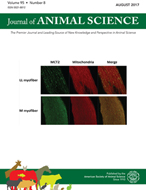-
Views
-
Cite
Cite
W. C. Weldon, A. J. Lewis, G. F. Louis, J. L. Kovar, P. S. Miller, Postpartum hypophagia in primiparous sows: II. Effects of feeding level during gestation and exogenous insulin on lactation feed intake, glucose tolerance, and epinephrine-stimulated release of nonesterified fatty acids and glucose, Journal of Animal Science, Volume 72, Issue 2, February 1994, Pages 395–403, https://doi.org/10.2527/1994.722395x
Close - Share Icon Share
Abstract
The objectives of this experiment were 1) to determine whether allowing sows ad libitum access to feed from d 60 of gestation affects glucose tolerance and 2) to determine whether exogenous insulin increases feed intake by preventing mobilization of nonesterified fatty acids (NEFA). Sixty crossbred sows were assigned to one of two feeding regimens during gestation, either a standard level of feed (SL; 1.85 kg/d) or allowed ad libitum access to feed (AL). Sows also received an injection of either .75 IU of insulin/kg BW or saline daily during the first 7 d of lactation. Exogenous insulin increased ADFI at d 7 of lactation (P = .07) and increased total feed intake at d 7 and 14 of lactation (P = .09). Total feed intake during d 0 to 21 was not affected by insulin treatment. Compared with the SL sows, the AL sows were less tolerant of glucose infusion (1 g of glucose/kg BW, i.v.) on d 1 of lactation (P < .01). Baseline and peak concentrations of insulin were not affected by feeding level during gestation (P = .4). Baseline and peak concentrations of NEFA were greater in AL sows than in SL sows (P < .001) and were not affected by insulin treatment (P = .39). Release of NEFA after epinephrine stimulation was greater in AL sows than in SL sows (P < .05). The data indicate that the reduced feed intake during lactation exhibited by sows that are overfed during gestation may be caused by insulin resistance. Exogenous insulin seems to increase feed intake by reducing plasma glucose rather than be affecting plasma NEFA.





